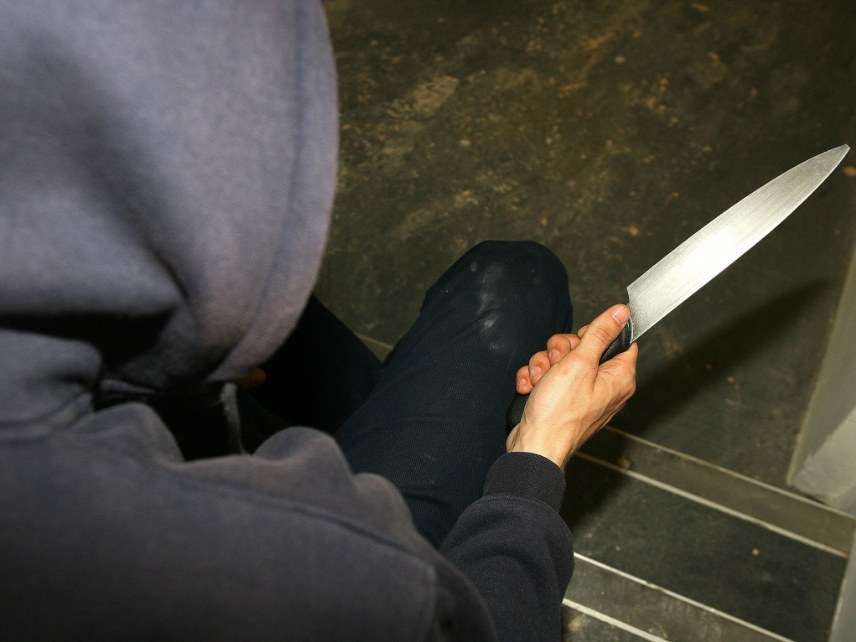Now They're Coming for People's Knives. No, Really.
London's got a homicide problem, but leaders insist it's being caused by the tools.

You'd better sit down for this one.
London has been suffering a spate of homicides recently, bad enough that some contend the murder rate is now worse than New York's. It is, but only if you look at the past couple of months. February, for instance, saw 11 homicides in New York and 15 in London, most of them committed with knives.
In light of that crime spike London's mayor, Sadiq Khan, has laid down the law. "No excuses," he declared the other day on Twitter. "There is never a reason to carry a knife. Anyone who does will be caught, and they will feel the full force of the law."
Britain imposes strict gun control. It also imposes absurdly strict knife control. The government forbids carrying a knife in public "without good reason, unless it has a folding blade with a cutting edge 3 inches long or less."
Take note: Lock-back knives—the kind in which the blade locks in the open position, to prevent accidental folding while the knife is being held, and thus lacerated fingers—are verboten no matter the blade length. Lock-backs "can include multi-tool knives—tools that also contain other devices such as a screwdriver or can opener." And a "good reason" for carrying a knife includes using the knife for work, or perhaps "historical reenactment or religious purposes." Not, say, self-defense, or just because a knife sometimes comes in handy.
Any violent death is a tragedy, but London's response to recent knifings borders on the comedic. London has a Knife Crime Strategy. The police recently called "an emergency meeting of community leaders" after a spate of stabbings. "[We] have been absolutely clear that we cannot tackle knife crime alone," said the Metropolitan Police.
More broadly, Britain operates under the governing assumption of gun control—which is that instruments cause crime, and if only the instruments could somehow be made to disappear, then so too would crime.
Hence "the UK has some of the toughest gun control laws in the world," reports the BBC. "If you want to own a gun, it is very difficult to do so. [The system] has been designed to put as many barriers [to gun ownership] in the way as possible and to assume the worst, rather than hope for the best." Would-be gun owners must obtain a license, which involves a lengthy process during which "independent referees provide confidential character statements" about the applicant's "mental state, home life, and attitude towards guns." (Note: home life.) Still, the BBC wonders: "Are there areas left that could be further tightened?"
The result of all this gun control? A London homicide rate higher than New York's, at least in the short term.
So now the city intends to crack down on knives. Khan also has announced that "patrols have been stepped up with extra stop-and-search powers in place in the worst-affected areas." If London is anything like New York, those stop-and-frisk policies will target minorities and the poor at highly disproportionate rates, without achieving much of anything: In New York, stop-and-frisk searches found weapons a mere 1.2 percent of the time.
"Our communities are sick and tired of the damage being done by knife crime," Khan writes in the city's Knife Crime Strategy. The strategy aims to "deter anyone thinking of carrying a knife." It notes that those who commit knife crimes are generally male and "frequently from a BAME background"—i.e., black, Asian, and minority ethnic. Some offenders are "habitual knife carriers." And for them, the government supports a policy of "two strikes and you're out"—"a minimum custodial sentence for those aged 16 and over who are convicted of a second or subsequent offence of possession of a knife or offensive weapon." The minimum sentence is four months for juveniles and six months for adults.
But that is still not enough for some. John Crichton, chairman of the Royal College of Psychiatrists in Scotland, wants the country to ban pointed kitchen knives as well. "He first suggested the move three years ago," reported the Express last year, "but his proposal did not win enough support from policy-makers. Since then dozens of people, including schoolchildren, have lost their lives as a result of attacks involving bladed instruments."
If Khan, Crichton, and Co. got their way, that would naturally solve London's violence problem, right? Of course not. In short order they would discover the need to ban some other instrument of violence—lead pipes or cricket bats, perhaps—because focusing on the instrument of violence attends to the symptom, not the disease. And, yes, sometimes treating horrific symptoms is preferable to not treating them. But as Londoners have learned, it's still no cure.
When gun-rights advocates warn that if gun-control groups win, they'll go after knives next, it sounds like an absurd exaggeration. In Britain, it's now official government policy.


Show Comments (227)